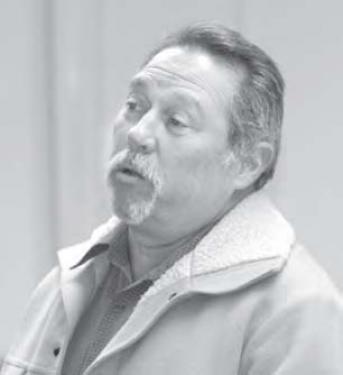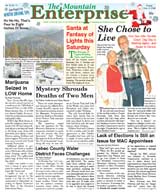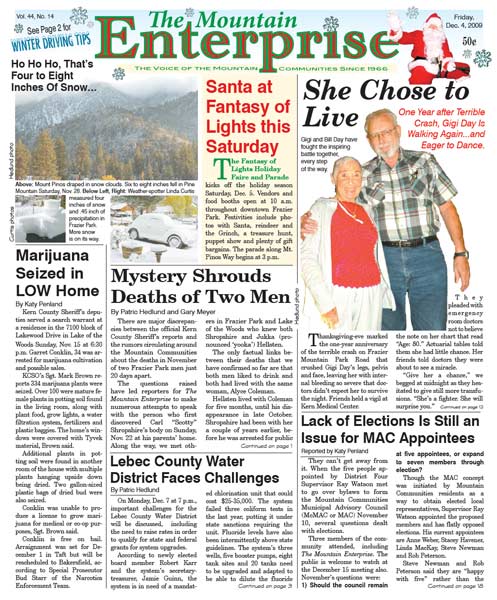
Steve Newman said Supervisor Watson would reject any bylaws that suggested elections.
Reported by Katy Penland
They can’t get away from it. When the five people appointed by District Four Supervisor Ray Watson met to go over bylaws to form the Mountain Communities Municipal Advisory Council (McMAC or MAC) November 10, several questions dealt with elections.
Three members of the community attended, including The Mountain Enterprise. The public is welcome to watch at the December 15 meeting also. November’s questions were:
1) Should the council remain at five appointees, or expand to seven members through election?
Though the MAC concept was initiated by Mountain Communities residents as a way to obtain elected local representatives, Supervisor Ray Watson appointed the proposed members and has flatly opposed elections. His current appointees are Anne Weber, Stacey Havener, Linda MacKay, Steve Newman and Rob Peterson.
Steve Newman and Rob Peterson said they are “happy with five” rather than the seven members proposed in the bylaws modeled on Kern County’s only other MAC, which is in Rosamond. Boys & Girls Club founder Linda MacKay said that if five members were listed in the bylaws, it would require an amendment to extend to seven. Retired L.A. County Sheriff’s Deputy Steve Newman observed that an amendment would require approval by the entire Board of Supervisors.
2) What about elections?
Linda MacKay made a formal motion that the MAC “go to elections in one year” and to state in the bylaws that “appointments are for one year.” There was no second to her motion. Discussion ensued anyway, with Tejon Ranch employee Rob Peterson and Realtor Stacey Havener saying they prefer to see the current three-year terms remain.
Newman agreed with them. He said, “I agree there ought to be elections but with the statement that’s been made by Ray Watson, anything tied to elections now is not going to get past him. It might get amended sometime later but now it’s not a change he’ll okay.”
Peterson said twice in the discussion that he doesn’t want to have to start “putting out ‘vote for Rob Peterson’ signs within six months,” and that to do so would “just detract energy away from our work.” Havener stated, “Right now, there’s not enough interest of the people to have an election.” Family Resource Center Director Anne Weber agreed, saying, “We have to prove ourselves to the District Supervisor.”
MacKay, trying to get in a word to defend her motion, said that she “doesn’t see a justification for waiting three years for an election. This [the MAC] isn’t something brand new. It’s reorganized and renamed, but serves the same purpose [as the previous Town Council].”
She added that the MAC, like the Town Council, was a “grassroots movement. That means it comes from the people, not from the county supervisor who’s in Bakersfield.” Then she added, “I see my motion isn’t going to have a second, so it dies.”
However, Havener continued the discussion with, “If we get the community involvement, we will get the support for elections… hopefully we’ll make this MAC so effective people will want to have an election. What value would it serve now? It has to have meaning, not to have an election just to have an election.”
Peterson said, “Eighty-two out of 83 MACs in California are appointed.” [The Mountain Enterprise was unable to find verification for Peterson’s factoid. The California State Association of Counties and the Senate Consultant on Local Governments both said there is no tracking of the number of MACs in the state. In a quick review of just three counties, we found six elected MACs in our first calls. When pressed for attribution, Peterson said he should have said “82 percent out of 83 MACs….” but we have still been unable to verify his comment.— Editor]
MacKay repeated: “It’s not a brand new entity—just renamed. We [the appointees] are not a group that came from the community, we came from the supervisor. But I’ll put it in the notes because the supervisor said he wanted to know all dissenting views.”
3) How is a MAC member removed?
The Rosamond bylaws make no mention of causes for removal, so the McMAC members agreed by consensus that if a council member misses three consecutive meetings or five in a calendar year, they can take their case for removal of the member to Ray Watson for consideration.
4) What about officers?
It was agreed that the four officers of the McMAC should follow the Rosamond model of Chair, Vice-Chair, Secretary and Budget Officer.
5) How to hire a clerk?
A lengthy discussion followed on how to find a clerk of the council in order to take minutes of the monthly meetings. Who would interview candidates for this position (the county or someone from McMAC)? How and when do they pay the clerk? Should the person be an employee or a contractor?
Newman said he’d contact the Rosamond MAC for guidance for this 6 to 10-hour-per-month position.
6) Should meeting times and dates be set in the bylaws? How is the public notified?
At an earlier informal working meeting, the third or fourth Tuesday was suggested. Newman said if this is written into the bylaws, and the date has to be moved, an amendment to the bylaws will take Board of Supervisors approval. MacKay said the Brown Act requires ample notice be given to the public about when meetings will take place and that they may want to consider alternating day and evening meetings to accommodate working people who may want to attend. Newman said, “Not in the bylaws. That would be the responsibility of the clerk to get the meeting times into the newspaper, at the post office and at the community center.”
7) How would appointees be trained in open meeting procedures?
Brown Act training for McMAC members was discussed, as was the use of Roberts Rules of Order, particularly for managing public input of nonagenda items. MacKay said the agenda should be posted in time for the public to request time to address the MAC or to raise agenda-related questions for discussion at that meeting.
The bylaws which come from this group must be reviewed by Supervisor Watson, then taken before the full Kern County Board of Supervisors for approval.
The public is invited to observe the Tuesday, Dec. 15 meeting at noon at the Frazier Park Assembly of God Church (3224 Mt. Pinos Way).
This is part of the December 04, 2009 online edition of The Mountain Enterprise.
Have an opinion on this matter? We'd like to hear from you.


